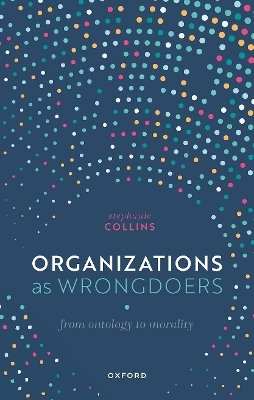
Organizations as Wrongdoers
From Ontology to Morality
Seiten
2023
Oxford University Press (Verlag)
978-0-19-287043-8 (ISBN)
Oxford University Press (Verlag)
978-0-19-287043-8 (ISBN)
Stephanie Collins presents a philosophical theory of organizational wrongdoing. States pursue unjust wars, businesses avoid tax, charities misdirect funds. Our social, political, and legal responses to these kinds of moral wrongdoing need guidance. Organizations as Wrongdoers illuminates what we're responding to and how we should respond to it.
Organizations do moral wrong. States pursue unjust wars, businesses avoid tax, charities misdirect funds. Our social, political, and legal responses require guidance. We need to know what we're responding to and how we should respond to it. We need a metaphysical and moral theory of wrongful organizations.
This book provides a new such theory, paying particular attention to questions that have been underexplored in existing debates. These questions include: where are organizations located as material objects in the natural world? What's the metaphysical relation between organizations and their members? Can organizations be blameworthy for attitudes and character traits, as well as for actions? What about feelings of guilt, remorse, and shame-can organizations feel these emotions and why does this matter? How and why are members implicated in organizations' wrongs? How should organizations' reparative costs be apportioned among members?
The book provides provocative answers to these questions. It argues that organizations are material objects with humans as material parts - much like how a pizza is a material object with slices as material parts. This picture helps us make sense of organizations' blameworthiness, including blame for organization-level actions, attitudes, and character traits. What's more, organizations can experience moral self-awareness - a crucial component of guilt, remorse, and shame. Members can be implicated in organizations' actions in numerous ways - and, it is argued, members' level of implication should determine their share of organizations' reparative burdens.
Organizations do moral wrong. States pursue unjust wars, businesses avoid tax, charities misdirect funds. Our social, political, and legal responses require guidance. We need to know what we're responding to and how we should respond to it. We need a metaphysical and moral theory of wrongful organizations.
This book provides a new such theory, paying particular attention to questions that have been underexplored in existing debates. These questions include: where are organizations located as material objects in the natural world? What's the metaphysical relation between organizations and their members? Can organizations be blameworthy for attitudes and character traits, as well as for actions? What about feelings of guilt, remorse, and shame-can organizations feel these emotions and why does this matter? How and why are members implicated in organizations' wrongs? How should organizations' reparative costs be apportioned among members?
The book provides provocative answers to these questions. It argues that organizations are material objects with humans as material parts - much like how a pizza is a material object with slices as material parts. This picture helps us make sense of organizations' blameworthiness, including blame for organization-level actions, attitudes, and character traits. What's more, organizations can experience moral self-awareness - a crucial component of guilt, remorse, and shame. Members can be implicated in organizations' actions in numerous ways - and, it is argued, members' level of implication should determine their share of organizations' reparative burdens.
Stephanie Collins is an Associate Professor of Philosophy at Monash University. She has received two major grants: a Mind Association Research Fellowship (on the topic of collective obligation) and an Australian Research Council Discovery Early Career Researcher Award (on the topic of organizational wrongdoing). She has published widely in these and other areas.
Part I: Metaphysics
1: The Reality of Organizations
2: Towards a Metaphysics of Membership
3: A Metaphysics of Membership
Part II: Blameworthiness
4: Varieties of Organizational Blameworthiness
5: Organizations' Moral Self-Awareness
Part III: Members
6: How Members are Implicated
7: Apportioning Members' Burdens
Conclusions
| Erscheinungsdatum | 17.05.2023 |
|---|---|
| Verlagsort | Oxford |
| Sprache | englisch |
| Maße | 149 x 222 mm |
| Gewicht | 390 g |
| Themenwelt | Geisteswissenschaften ► Philosophie ► Ethik |
| Geisteswissenschaften ► Philosophie ► Metaphysik / Ontologie | |
| ISBN-10 | 0-19-287043-2 / 0192870432 |
| ISBN-13 | 978-0-19-287043-8 / 9780192870438 |
| Zustand | Neuware |
| Informationen gemäß Produktsicherheitsverordnung (GPSR) | |
| Haben Sie eine Frage zum Produkt? |
Mehr entdecken
aus dem Bereich
aus dem Bereich


